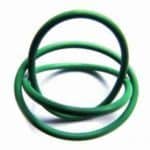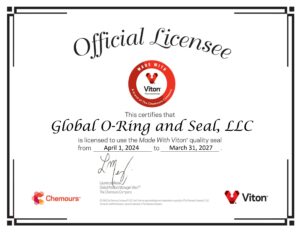Genuine Viton® O-Rings: Fluorocarbon (FPM, FKM, Viton®) Material
 Global O-Ring and Seal carries a deep and broad inventory of Viton® o-rings in AS568 and metric sizes. Click the button below to check the inventory for Viton® o-rings, or submit the Product Inquiry form if you need a special type or size of Viton® o-ring you can’t find in our online store.
Global O-Ring and Seal carries a deep and broad inventory of Viton® o-rings in AS568 and metric sizes. Click the button below to check the inventory for Viton® o-rings, or submit the Product Inquiry form if you need a special type or size of Viton® o-ring you can’t find in our online store.
Official Viton® Licensee
At Global O-Ring and Seal, all of our Standard AS568 Viton® o-rings are available in Genuine Chemours Viton®, not a generic FKM. Learn more about the Genuine Chemours Viton® advantage. Click here to view our Official Viton® Licensee Certificate.
Viton® Material Description
Viton® is a trade name for the Chemours brand of fluorocarbon, also known as FKM. As a high-performance rubber, Viton® is renowned for its exceptional resistance to a broad range of substances, including high temperature, ozone, weather, oxygen, mineral oil, fuels, hydraulic fluids, aromatics, and many organic solvents and chemicals. Its performance varies by the level of fluorine content in the polymer, with an increase in fluorine improving fluid resistance but reducing low-temperature flexibility.
Viton® Variations
Viton® variations include Viton® A, Viton® B, Viton® F, Viton® GLT, Viton® GFLT, Viton® Extreme (ETP), High-Visibility Viton®, and Metal Detectable Viton®.
Standard Types of Viton® (A, B, F) are defined by their relative resistance to chemicals due to different levels of fluorine content. Viton® general type A has a 66% composition of fluorine, Viton® middle fluorine content type B has a 67-68.5% composition of fluorine, and the high fluorine content type F has a 70% composition of fluorine. Of these standard types, Viton® F demonstrates the best fluid resistance but reduced flexibility at low temperatures. On the other hand, Viton® A has the best flexibility at low temperatures and comparatively reduced fluid resistance.
Because of this tradeoff between chemical resistance and low-temperature flexibility, Viton® GLT and GFLT were created using copolymerized fluorinated vinyl ether monomer. This allows for Viton® GLT and GFLT to offer excellent chemical resistance while maintaining low-temperature flexibility.
Extreme Viton®, or Viton® ETP, exhibits the same chemical resistance as standard types of Viton® with additional resistance to acids, hydrocarbons, low molecular weight esters, ketones, aldehydes, and highly caustic solutions.
High-Visibility Viton® is recommended in applications that require o-rings to be highly visible (typically in downhole drilling). High-Visibility Yellow Viton® o-rings maintain properties identical to its original compound, with the addition of a distinguishable neon hue.
Metal Detectable Viton® allows for o-ring fragments as small as 2mm to be identified and extracted to ensure safety and compliance with FDA regulations. Viton® metal detectable o-rings retain the same qualities as the general Viton® o-ring compound.
For more detailed information on specific types of Viton®, please download the Viton® Selection Guide.
Physical Property Difference Among Types/Families of Viton
| Type | Compression Set Resistance | Chemical Resistance | Low-Temperature Flexibility |
|---|---|---|---|
| A | Excellent | Good | Good |
| B, GBL-S | Very Good | Good | Good |
| F, GF-S | Good | Very Good | Good |
| GLT-S | Very Good | Good | Excellent |
| GFLT-S | Very Good | Very Good | Very Good |
| ETP-S | Good | Excellent | Good |
Cure System
The curing system used to vulcanize the elastomer, also known as cross-linking, significantly affects the final physical property characteristics of the compound.
Bisphenol Cured (A, B, F): Offers fast cure rates, excellent scorch safety, and resistance to compression set.
Peroxide Cured (GLT, GFLT, ETP): Offers enhanced resistance to aggressive substances, including lubricating oils, steam, mineral and organic acids, and aggressive biodiesel. They have a similar hydrocarbon fluid resistance to polymers with the same fluorine content cured with bisphenol.
Viton® O-Ring Compounds
| Compound | Durometer | Color | Temp Range (F) | Data Sheet | Description |
|---|---|---|---|---|---|
| V70728 | 70 |
White |
-13 to +482 |
|
USP Class VI Certified |
| V75101 | 75 |
Black |
-15 to +450 |
|
General purpose Genuine Viton |
| V75193 | 75 |
Black |
-13 to +482 |
|
Chemours Genuine Viton - JDM H4P |
| V75201 | 75 |
Brown |
-15 to +450 |
|
General purpose Genuine Viton |
| V75BK53 | 75 |
Black |
+5 to +428 |
|
Viton ETP, Excellent chemical resistance |
| V75BL12 | 75 |
Blue |
-15 to +450 |
|
Metal Detectable |
| V90101 | 90 |
Black |
-15 to +450 |
|
General purpose Genuine Viton |
| V90104 | 90 |
Black |
-4 to +482 |
|
Rapid Gas Decompression, General Purpose |
| V90105 | 90 |
Black |
-31 to +482 |
|
Rapid Gas Decompression, Low Temp |
| V90193 | 90 |
Black |
-13 to +482 |
|
Chemours Genuine Viton - JDM H4R |
| V90HG | 90 |
Green |
-15 to +450 | High-Visibility Genuine Viton | |
| V90RGD | 90 |
Black |
+5 to +428 |
|
Rapid gas decompression resistance, Genuine Viton |
| V1238 | 95 |
Black |
-15 to +400 |
|
Rapid gas decompression resistance |
| V95RGD | 95 |
Black |
+5 to +428 |
|
Rapid gas decompression resistance, Genuine Viton |
* Viton® is a registered trademark of The Chemours Company
Product Inquiry
Differences in Fluid Resistance Among Types of Viton Fluoroelastomers
| Fluid | A | B | F | GLT | GFLT | ETP |
|---|---|---|---|---|---|---|
| Hydrocarbon Automotive, Aviation Fluid | Excellent | Excellent | Excellent | Excellent | Excellent | Excellent |
| Oxygenated Automotive Fuels | Not Recommended | Very Good | Excellent | Not Recommended | Excellent | Excellent |
| Reciprocating Engine Lubricating Oils (SE-SF Grade) | Very Good | Excellent | Excellent | Excellent | Excellent | Excellent |
| Reciprocating Engine Lubricating Oils (SG-SH Grade) | Not Recommended | Very Good | Very Good | Excellent | Excellent | Excellent |
| Aliphatic Hydrocarbon Process Fluids | Excellent | Excellent | Excellent | Very Good | Excellent | Excellent |
| Aromatic Hydrocarbon Process Fluids | Very Good | Very Good | Excellent | Very Good | Excellent | Excellent |
| Aqueous Fluids: Water, Steam, Mineral Acids | Good | Very Good | Very Good | Excellent | Excellent | Excellent |
| Amines, High pH Caustics | Not Recommended | Not Recommended | Not Recommended | Good | Good | Excellent |
| Low Molecular Weight Carbonyls | Not Recommended | Not Recommended | Not Recommended | Not Recommended | Not Recommended | Excellent |

 English
English  Español
Español  Français
Français  Português
Português  Deutsch
Deutsch  Italiano
Italiano  Русский
Русский  中文
中文  日本語
日本語  العربية
العربية  हिन्दी
हिन्दी 